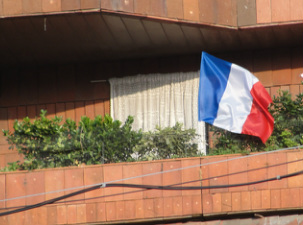 After I wrote "How France Changed Me," I realized there were a lot of significant changes that I left out. With no further adieu, here are a few more ways that I have been transformed.
1. I use the metric system. I am not afraid of Celsius, kilometers or milliliters anymore. I can even tell you what a centiliter is.
2. My social etiquette has changed. You will find me waiting for a bon appetit before beginning to eat. My finger foods group has shrunk. I find kissing people to say hello and goodbye more or less normal.
3. I use the 24-hour clock. Seven p.m. is now 19:00. Midnight is now 0:00. The nice thing about the 24-hour clock is that you can't mistakenly set your alarm for a.m. instead of p.m. I'm converted!
4. My friends are just my friends. Growing up in a fairly homogenous population, other ethnicities and nationalities were rare. In France, it was pretty normal to meet people from other countries. I no longer have American friends and French friends. Friends are friends. Period.
5. I value Sabbath time more. In France, everything was closed on Sundays. At first, I had to be intentional about making sure I had everything I needed on Saturday. After a while, I appreciated the quiet of Sundays and the fact that nearly everyone could rest and/or spend time with their family and friends on that day. Also, in learning a new language and adapting to a new culture, I was tired more often. This was more difficult than stores being closed. Eventually, I accepted the fatigue and gave myself permission to read a book, take a nap or go to bed early once in a while.
 "Variations Sur Un Air Du Pays D'Oc" was lying on top of my end table when I was looking for clarinet music to practice this summer. I knew I had packed it, but I honestly didn't know much about it.
I played this for a high school contest when the only French I knew was, "bonjour" and "merci." I'm sure my French friends would have been appalled at my Anglicized pronunciation, which would have gone something like, "Vay-rie-ay-shuns suhr unn air doo payz dock."
Now, having lived in France for several months, I knew that pays d'oc was referring to the region of France where Occitan, a dialect, is spoken. Toulouse, the city I was living in, belongs to this language group.
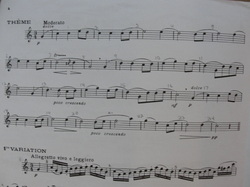 After doing a bit of research, I learned that the composer, Louis Cahuzac, grew up less than two hours from Toulouse and attended the Toulouse conservatory. This piece was based off of a folk tune, Se Canto, originating in the valley of the Garonne (which is the river that runs through Toulouse). I never imagined that I would get so "close" to this music.
How did this high school musician from Minot, ND end up as a 20-something Christian worker in Toulouse, France? God only knows.
He knew long before I even learned to play a clarinet, that I would be called to serve in France. He knew I would become a part of a beautiful community where I could walk alongside and support nationals, learn French and even be given the opportunity to play in a French clarinet ensemble (with clarinetists and teachers from this very same conservatory).
Already, the variations of my life that God has written astonish me. The timid girl who couldn't even raise her hand to use the bathroom became a high school student who loved performing. That young woman became a college student with three majors, who felt called to lead a team of five strangers playing music and doing relational ministry in the US and South America after she graduated. That fledgling leader got broken of entitlement during a 15-month period of underemployment, started a couple ministries with help from friends, organized some renegade trips to serve in Ecuador and China while working full-time and then left it all to move to France.
Now, in my last years of my 20s, I am off to Berlin to tell the stories of what God is doing as Christians unite to seek the welfare of the city. Do I know what this next variation will bring? Not completely. But I know that God writes some incredibly beautiful symphonies out of our brokenness and weaknesses and that His plans are much more extensive and trustworthy than mine.
"'For I know the plans I have for you,' declares the Lord, 'plans for welfare and not for evil, to give you a future and a hope.'" – Jeremiah 29:11
It doesn't look like much, does it? A bunch of posts and a bit of plant rubble.
It is common knowledge that fine wine undergoes an aging process, but I didn't know until my family and I visited several vineyards in Graves, France, that the plants themselves must also reach maturity.
How long does it take? According to the master of this vineyard in Graves, France, it will take ten or more years for these vines to resemble the ones below. A whole decade? Just to start producing enough grapes for wine? Now granted, once the vines begin producing, they will continue to bear fruit for well over a decade, provided that they are well-tended to and the conditions of the soil and weather patterns are conducive to the grapes' development.
My experience in the vineyard caused me to rethink what Jesus had to say about the vine and the branches.
"I am the true vine, and my Father is the vinedresser. Every branch in me that does not bear fruit he takes away, and every branch that does bear fruit he prunes, that it may bear more fruit. Already you are clean because of the word that I have spoken to you. Abide in me, and I in you. As the branch cannot bear fruit by itself, unless it abides in the vine, neither can you, unless you abide in me. I am the vine; you are the branches. Whoever abides in me and I in him, he it is that bears much fruit, for apart from me you can do nothing." – John 15:1-5
As branches on Jesus' vine, we are dependent upon Him to bear fruit. I cannot bear fruit on my own anymore than a branch of an apple tree can produce an apple when it has been broken off the tree. I am completely dependent on the Gospel of Jesus Christ and the pruning and care of God the Father, the vinedresser, to grow. Apart from Him, I can do nothing.
I have no control of the process either. I can't fast-forward through the years required to grow. It is in God's timing.
The pressure is also off of me. No amount of spiritual discipline is going to expedite growth. All I can do is abide. It is also not dependent on me to make others bear fruit either, for it is God's vineyard. He knows exactly what each branch needs and tends to each one. I can't even come close to his knowledge and care.
So how will anyone know that I am abiding in Christ? By the God-produced fruit in me.
"You will recognize them by their fruits. Are grapes gathered from thornbushes, or figs from thistles?" – Matthew 7:16
The French school of wine-producing is also unique in that they use terroir – that is a sense of place that includes all conditions including geography, geology and climate. Each terroir dictates what variety of grape will best grow there. A vinedresser can't decide one year to grow one kind of grape and try a different one the next year.
This concept of terroir influences how wines our named. All of France is divided in to appellations, literally callings. The names of French wines come from where the vineyard is located. The wine of each region tastes different because of where it was grown.
As Christians, we bear the name of our vine, Jesus Christ. As His strength is manifest in us, we bear fruit – fruit that looks, smells and tastes like the life-giving hope we have in Him. What a privilege it is to bear His name!
 Translation is not easy. It is even harder when it involves specialized language.
For one of my last language school projects, I presented a poem I had written as a critique of adolescent use of internet dating and short-hand chatroom vocabulary.
The only issue was that I needed to translate into French. So after hours researching French texting lingo. Here's the original and the French "translation" side by side:
| <3 sugary sweet sara <3 says:
i met my bf 2day
@ cupid.com
that's y i couldn't talk 2 u b4
i said 2 him, how r u? want 2 im?
@ cupid.com
i could c my bf pic ;-) lol
i said 2 him, how r u? want 2 im
on msn
i could c my bf pic ;-) lol
i couldn't stop :-)ing
on msn
omg he is like sooo hott
i couldn't stop :-)ing
@ the hottest guy on the www
omg he is like sooo hott
i <3ed him already
the absolutely hottest kewlest guy on the www said g2g, cya
i asked y
i <3ed him already
bc idk
i asked y
i was soooo :-( he was offline, I wanted 2 :’(
bc idk
omg is that him?
i was soooo :-( he was offline…jk
that's y i couldn't talk 2 u b4
omg! it is him! he says hi :-0 ttyl
i met my bf 2day
| <3 sara super sucrée <3 dit:
G rencontré 1 mek auj
@ cupid.com
C pr ça ke j ne pouvé pa te parlé avan
J l8 é di slt komencava ? TOQP ? parlo
@ cupid.com
J pouvé voir son foto mdr ;)
J l8 é di, slt komencava ? TOQP ? parlo
sur msn
J pouvé voir son foto mdr ;)
j ne pouvé pa aréT 2 J
sur msn
omd il è oZ
j ne pouvé pa aréT 2 J
@ Le mec le + oZ sur le net
omd il è oZ
J l8 é déjà di jtm
le mec le + oZ sur le net m’a dit g2g @+
G 2manD Pkoi
J l8 é déjà di jtm
PK jnsp
G 2manD Pkoi
j’éT tllmt L Kil éT DconnecT. J voulé :’(
PK jnsp
omd C l8 ?
j’éT tllmt L Kil éT DconnecT… j'dec
C pr ça ke j ne pouvé pa te parlé avan
omd C l8 ! il di slt :O @+
G rencontré 1 mek auj
| For those of you who know French, here is the key for understanding the texting language:
| <3 = un cœur, aimer
G = J’ai
1 = un
mek = garçon
auj = aujourd’hui
@ = à
C = c’est
pr = pour
ke = que
jJ= je
pouvé = pouvais
pa = pas
parlé = parler
avan = avant
l8 = lui
é = ai
di = dit
slt = Salut
komencava ? : Comment ça va ?
TOQP ? : T’es occupé ?
parlo = Parlons
| foto : photo
mdr = mort de rire
aréT = arrêter2 = de
omd = Oh mon dieu !
è = est
oZ = osé
+ = plus
net = Internet
jtm = Je t’aime
g2g = je dois partir
@+ = à plus
2manD = demandé
Pkoi = Pourquoi ?
PK = parce que
jnsp = je ne sais pas
j’éT = j’étais
tllmt = tellement
Kil = qu’il
DconnecT = déconnecté
voulé = voulais
j'dec = je déconne
|
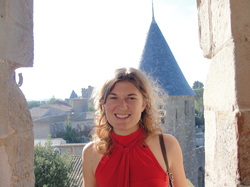 "Cheveux" or "chevaux." One letter makes all the difference. The first means "hairs," and the second means "horses." It may have been fear of saying, "Je veux couper mes chevaux," (I want to cut my horses) that caused me to wait nine months between haircuts (yes, my last haircut was back in the States).
Anyways, a haircut in France is quite the experience. First, my hairdresser and his last client tried to guess my nationality. They guessed pretty much every nationality in Western Europe and Scandinavia before giving up.
After that game was done, we went down to business. He didn't want to give me just a haircut but a style. He showed me all kinds of photos of looks that he just "adored." Once we settled on a look, he went to work, shampooing my hair and then cutting it seemingly at random. He even showed me a Spanish haircutting technique, which he called "magic," where hair is twisted vertically to make a tower and then let go while cutting whatever hair the scissors meets in the whirlwind. Apparently this gets rid of dead ends.
My hairdresser was infatuated with his work. He would consistently ooh and ahh at his creation (yes, the words, "oh la la" did come out of his mouth). He then proceeded to ask me about my love life and was entirely convinced that I was going to spend that night winning over men's hearts. He continued to tell me how beautiful I was (in a non-creepy way) and lectured me about how I shouldn't have insecurities. "Can't you see that you are beautiful?" he asked me. "You are beautiful." I guess a self-esteem boost comes with the package ;).
To top everything off, he pretty much made me make claws and growl in the mirror (after all, the haircutting smock I was in was an animal print...it was only natural). Watch out world!
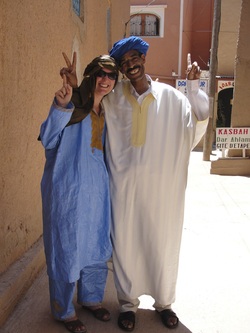 Powerless. This is what I felt like as a woman in Morocco.
Don't get me wrong. Morocco is a beautiful, incredible country. I was blown away by breathtaking sights – the Atlas Mountains, ancient cities, endless rolling sand dunes.
My trip with my friend Alyssa was my first taste of life in a non-Western, Muslim-dominant culture. Unintentionally, we also arrived near the end of Ramadan.
Immediately I noticed 98 percent of workers were men, and 98 percent of women had covered heads (the best was the woman with a burqa riding a motorcycle...that's talent!).
We immediately fell prey to one of the many "helpful" men, who called out to us and "made us" accept their help. When the young man asked us for money for his help (he led us around the labyrinth of the Marrakesh medina) to make sure we would be dependent on him, I told him we had nothing to offer him. But my word meant nothing. Even when I chewed him out in French (a first for me) and offered him a coin that Alyssa had, he continued to yell and bang on the door. Only the guest house owner (a man) was able to make him leave.
On the streets, we would get hassled and cat-called. That is, unless a man was with us. Silence.
When we got bedbugs, I brought Exhibit A (the bedbug I captured in my sleep) and prepared a beautiful presentation with identical verified bedbug pictures that I found on the internet. It didn't matter. I was told that the bug was just a mosquito that flew in through the window.
As a result of the bedbugs, we bought Moroccan clothing. The shop owner was happy to show us all his kaftans and offer us a great price. However, when I was ready to pay, the price rose by about 30 percent. I expressed my displeasure and stated the price he had quoted.
Just then, our bus driver (a man) who was also in the shop, began yammering at the shop owner in Berber. I couldn't understand what they were saying, but after observing disgruntled and concessionary body language, it was clear that the shop owner had given in. The price was lowered back to the original, not just for me, but also for Alyssa. Justice.
My experiences in Morocco showed me just how much I am in need of an advocate; someone who can intercede and bring justice. In Western societies, there isn't much that I can't do as a woman. I am independent. But I realize that in other cultures and also biblically, I need help.
In the Bible, there were high priests who interceded for the people, so that they would be able to approach God without fear of God's wrath for their sin. Now, there aren't need for for additional high priests, as Jesus serves as the ultimate high priest.
Now there have been many of those priests, since death prevented them from continuing in office; but because Jesus lives forever, he has a permanent priesthood. Therefore he is able to save completely those who come to God through him, because he always lives to intercede for them.
Such a high priest truly meets our need—one who is holy, blameless, pure, set apart from sinners, exalted above the heavens. Unlike the other high priests, he does not need to offer sacrifices day after day, first for his own sins, and then for the sins of the people. He sacrificed for their sins once for all when he offered himself. For the law appoints as high priests men in all their weakness; but the oath, which came after the law, appointed the Son, who has been made perfect forever (Hebrews 7:23-28)
What a comfort it is to know that I have Jesus who lives to intercede for me and all believers. That in spite of my weakness (in this case, sin), I am saved and thus stand justified before God because of the "once-for-all" work of Jesus on the cross.
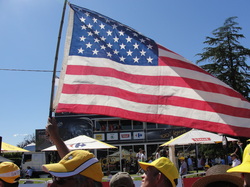 Americans are patriotic – even in France. Americans are patriotic – even in France. What does it mean to be patriotic? Is it in outward symbols?
Is it in the waving of flags, in the singing of patriotic songs and national anthems, in wearing national colors, in speaking a language, in having an army, in watching a parade, in setting off fireworks, in celebrating a national holiday?
When I came to France, I assumed it was a very patriotic country. Like the United States, it is a historically powerful country. Many countries were originally colonized by France. There are 33 that claim French as an official language (second only to English, spoken as an official language in 45 countries). Both French and English are taught in every country of the world and spoken on five continents.
While it is true that most French people I have met are proud to claim their nationality and passionate about their language, the manner of expressing this patriotism is displayed much differently. I can't make any assumptions about levels of patriotism in France as compared to the United States. Maybe the age of our countries plays a factor. The oldest city in France, Marseille, dates back to 600 BC. European colonization in the United States didn't begin until 1600, and the country declared its independence from Britain in 1776.
Perhaps, patriotism in France is more of an inward pride rather than an outward display. According to Myers-Briggs research (that test of E/I, N/S, F/T, J/P), American culture is predominantly extroverted thinking whereas French culture is predominately introverted feeling.
I may be an introverted feeler, but I grew up in an extroverted thinking culture. So on July 4, although I didn't want to be too obviously patriotic outside of my home country, I still felt the need to wear red, white and blue (no American flags though) and put fireworks and the Statue of Liberty on my Facebook wall. Friends asked me if I was doing anything to celebrate in France. I don't know that there were many celebrations, but I know there was at least one at the US Embassy (which I wasn't able to attend).
On July 14 (France's national holiday aka Bastille Day), I was prepared to wish all my French friends a "Happy 14th of July," see French flags everywhere and listen to the Marseillaise (the French national anthem) all day long.
Now I did hear the Marseillaise (granted, the first time was during a performance of the 1812 Overture which was written to celebrate victory over France, but the national anthem was still quoted, nevertheless). There were outdoor celebrations, fireworks and parades (traditionally in France there is always a large military parade).
However, most people were not wearing "national" colors, and one French friend was insistent that you shouldn't say anything to wish people a happy national holiday (others later said that it was allowed). In church, we sang no patriotic hymns nor did we pray for the country as we often do in the US. I saw one lone French flag (I'm not sure if it always there or was displayed for the celebration). I heard some French music, but I also heard a great deal of music in English.
I was surprised by this apparent lack of patriotism. But then again, do outward displays say anything about inner allegiance? Does a flag in my hand make me a citizen of a country?
I'm not sure how to measure patriotism. It may be that it's not in flags, patriotic lyrics or in grandiose displays of national pride. Nevertheless, I am challenged being outside of my home culture to really consider what it looks like to be a proud citizen of a country. I am also challenged to rethink what it means to be a citizen of the United States and to represent my country well – at home or away.
 I commemorated my first birthday overseas with an ice-themed party. The word glace in French can mean ice or ice cream, so we had both!
It was my (and everyone else's) first time carving ice sculptures and making large quantities of homemade ice cream. Both were big hits thanks to high-fat French cream for the ice cream and food coloring that my brother brought for me from the States and my roommate Lucy's tool collection for the sculptures.
I invited a bunch of new friends, and surprisingly, almost everyone came. My community here is incredibly supportive, generous and loving -- I am blessed. For more glimpses of my party, check out the slideshow below.
 I mentioned in my last post that the Toulouse clarinet ensemble that I play with was taped during two of our performances at the open air festival. Well today the director sent us all a link to one of the videos about the festival.
You can see and hear our ensemble play and also take in the sights and sounds of the day. One of goals of the day was to get people back in touch with the earth and agriculture. There were nature walks and various activities (you can even watch little kids make brioches).
The video is all in French, so for those of you who are francophones or just want to listen to the language, have fun! The music, of course, is a language of its own :).
 Small victory: unlocking the oven door to release the burnt lasagna. Small victory: unlocking the oven door to release the burnt lasagna. Sometimes as a driven, perfectionistic overachiever, I want to be able to do everything. And not only that, but I want to do it faster, better and beyond anyone's expectations of me. As you might imagine, this often becomes a stumbling block of sorts. And when you run full speed into a stumbling block...well, let's just say that it isn't a pretty sight. You might say it is kind of like lasagna after being locked (literally) in an oven for 24 hours and then going through the cleaning cycle (in order to disengage the lock) – still in one piece, more or less recognizable, but not really beneficial for much of anything. One thing I have learned to do during my first months here is to celebrate small victories. It is in reflecting on these little improvements, that I see progress and the grace of God in my life. Here are some of the victories I have celebrated since I arrived in late February: - understanding everything spoken to me in the check-out line
- taking a nap three days in a row
- praying in French
- successfully conversing with a native speaker
- learning how to pronounce my name (it is so hard from me to distinguish my name from "Daniel" and to mute the "h" in "Hance")
- roasting peanuts and making my own peanut butter (a lot cheaper than buying it here and tastier)
- being invited into a French friend's home
- sharing the story of my call
- successfully navigating myself to a new place in the city
- being able to feign accents while speaking French
- greeting and having small talk with my neighbors
- building our French association's website
- having friends accept my invitations to come to events
- being asked if I was French
- hanging out with a group of friends
- successfully giving directions
- hosting a game night
- making an appointment with the chiropractor
When I look at this list, I realize that, as cliché as it sounds, there are a multitude of abilities that I have taken from granted. And one of the beautiful results of living in another culture is a newfound appreciation for what I can do. It is also a greater realization of my dependence and necessity of God's power and strength. I can't do everything, and I don't have to. But I will do what God calls me to do, knowing that He is able to do immeasurably more than I can ask or imagine by His power at work inside of me ( Ephesians 3:20).
|



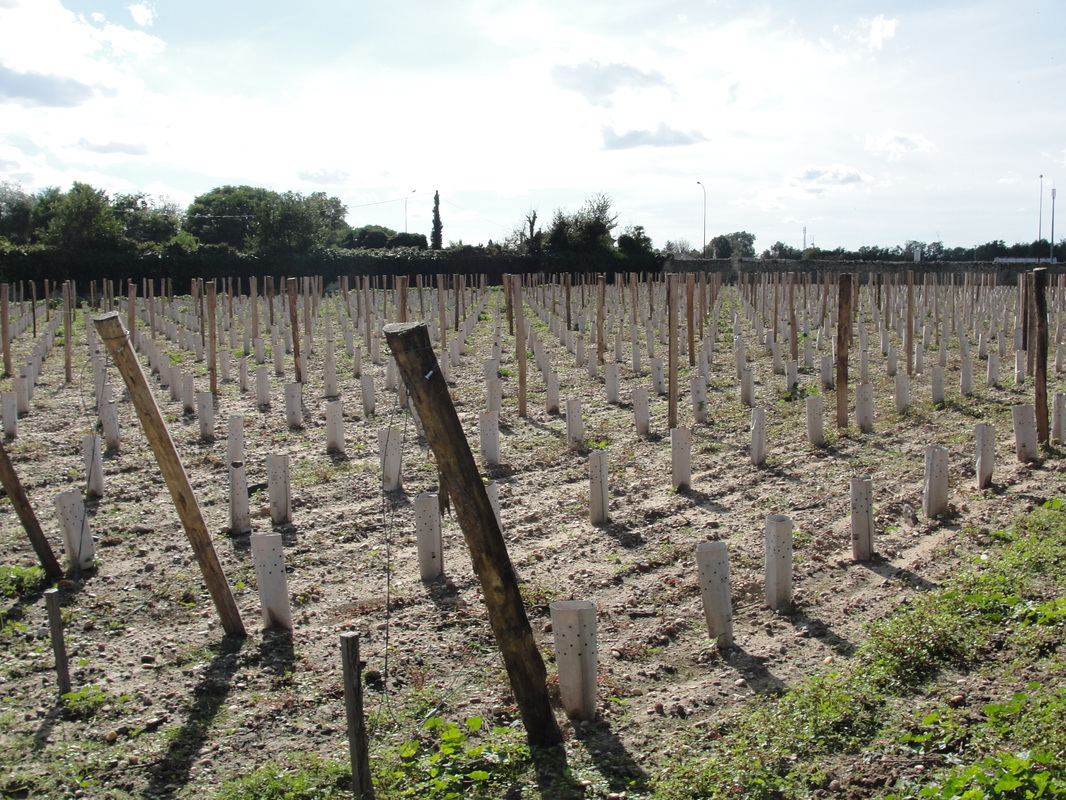
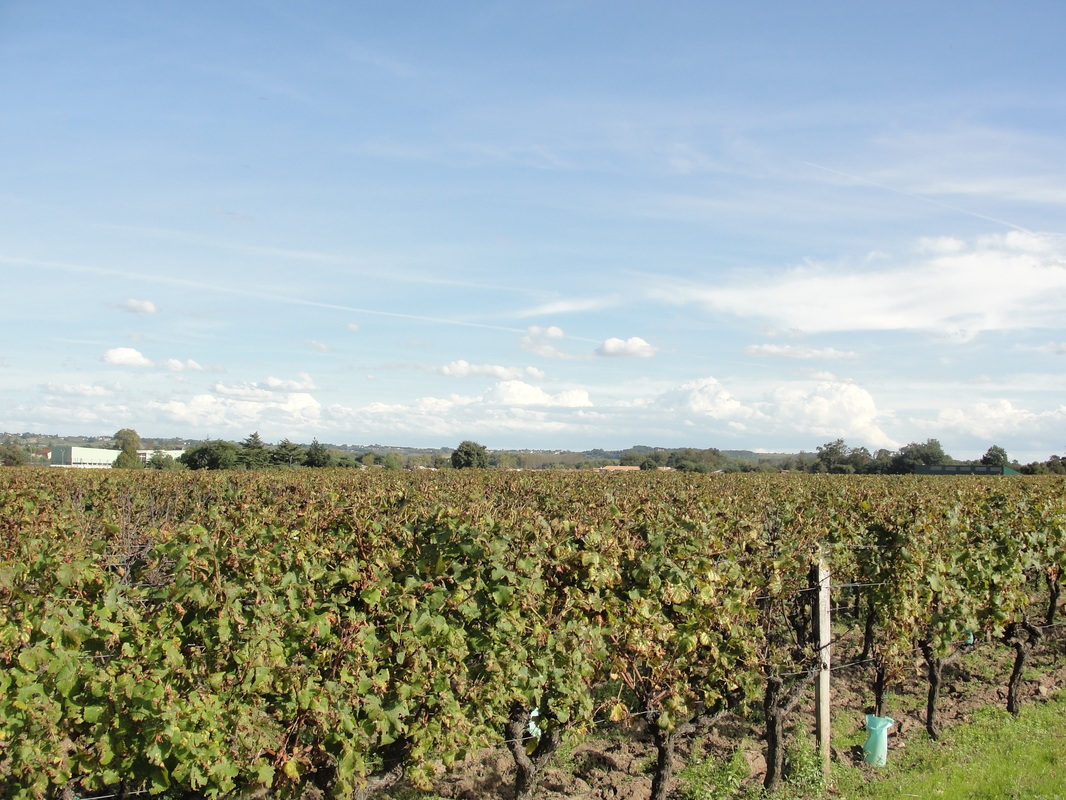







 RSS Feed
RSS Feed